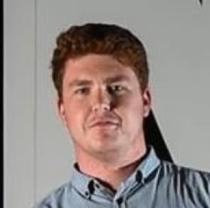Who makes the AFL team of the 21st century?
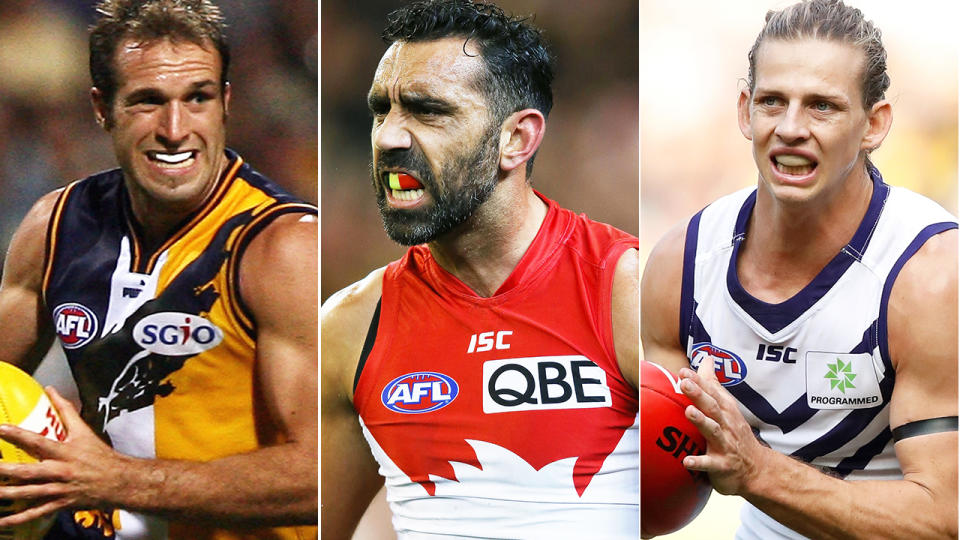
Defining the greats of any sporting era is a tough ask - but with the AFL on hiatus for the foreseeable future, what better time than now to figure out the best 22 from the past 20 years.
Aussie rules football has gone through significant change since the year 2000 - as the triple premiership winning Brisbane Lions, defined by their hardness and toughness gave way to the arm-wrestle over the flag between Sydney and West Coast.
'WORTH A SHOT': Basil Zempilas defends Ben Cousins interview after arrest
‘KICK PEOPLE TO DEATH’: McGuire and Caroline Wilson clash on-air
The late 2000s saw the press begin to come into vogue - defensive teams like Collingwood and St Kilda were advantaged, but the likes of Geelong and Hawthorn, in particular, became skilled at breaking down such defensive schemes to gain a stranglehold on the premiership cup.
As the league has attempted in recent years to encourage a more free-flowing, attacking style, Richmond emerged as a contender for one of the best teams of the 2010s - despite beginning the decade enduring a series of disappointing seasons.
Trying to piece together a team from such an eclectic time in AFL history is no mean feat - so let us know who you think missed out, who is in the wrong spot, and who shouldn’t be there at all.
Backs: Corey Enright, Matthew Scarlett, Heath Shaw
This trio of elite defenders can offer you a little bit of everything.
Geelong’s Matthew Scarlett is arguably the best true fullback of the last 20 years (with apologies to Essendon legend Dustin Fletcher), while teammate Corey Enright was a six-time All Australian who was just as much at home on the half-back line as he was on the last line.
Enright starts in the back pocket opposite Heath Shaw, who played a massive role on Collingwood’s 2010 flag victory over St Kilda.
Shaw’s continued success with the Greater Western Sydney Giants assures his place as one of the great modern defenders. His smother of Saints great Nick Riewoldt, who was ready to roost a goal into the stands, still makes fans shudder to this day. One of the best rebounding defenders the game has seen, Shaw was pivotal in Collingwood’s 2010 premiership breakthrough.
Honourable mentions: Dustin Fletcher (Essendon) Shaun Burgoyne (Hawthorn), Dale Morris (Western Bulldogs)
Half-backs: Shannon Hurn, Alex Rance, Luke Hodge
Alex Rance could easily have found himself at full-back, but his intercept marking and rebound game separated him a bit from Matthew Scarlett. He might have decided to pull the pin early on his already outstanding career, with two premierships and five All-Australian nods over an 11-year career.
The West Coast Eagles have arguably been one of the most consistent teams of the 21st century, and Shannon Hurn has played no small part in that. Known for his absolutely thumping right boot, Hurn is an instinctive defender capable of jump-starting offence at lightning speed thanks to his range and precision foot skills. One of the longest-serving captains of West Coast, Hurn’s leadership is one of his standout qualities.
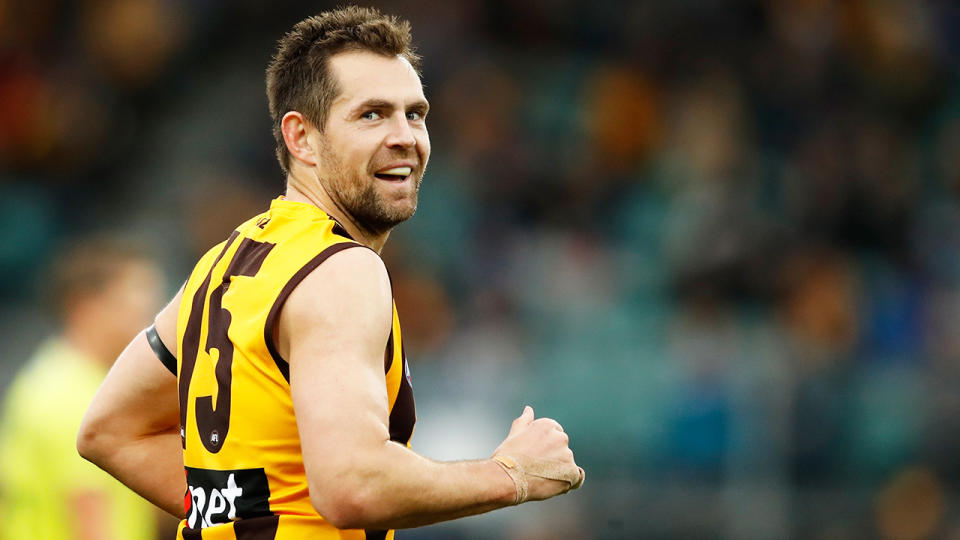
What can be written about the toughness and footy IQ of Luke Hodge that hasn’t already been said? The heart and soul of Hawthorn’s three-peat in 2013-15, as well as their breakthrough 2008 flag, Hodge epitomised toughness in the modern era.
Honourable mentions: Brian Lake (Western Bulldogs/Hawthorn), Josh Gibson (Hawthorn), Harry Taylor (Geelong)
Centres: Scott Pendlebury, Chris Judd, Adam Goodes
Picking a midfield from the last 20 years is a nigh-on impossible task - so prepare to be mad about someone who missed out.
Scott Pendlebury however, deserves a place here. The epitome of class as a modern footballer, Pendlebury ranks either above average or elite in almost every statistical category. The best midfielder on the park to have not won a Brownlow Medal, Pendlebury’s six All Australian selections and 2010 Norm Smith Medal more than tell the story of one of the last 20 years’ best.
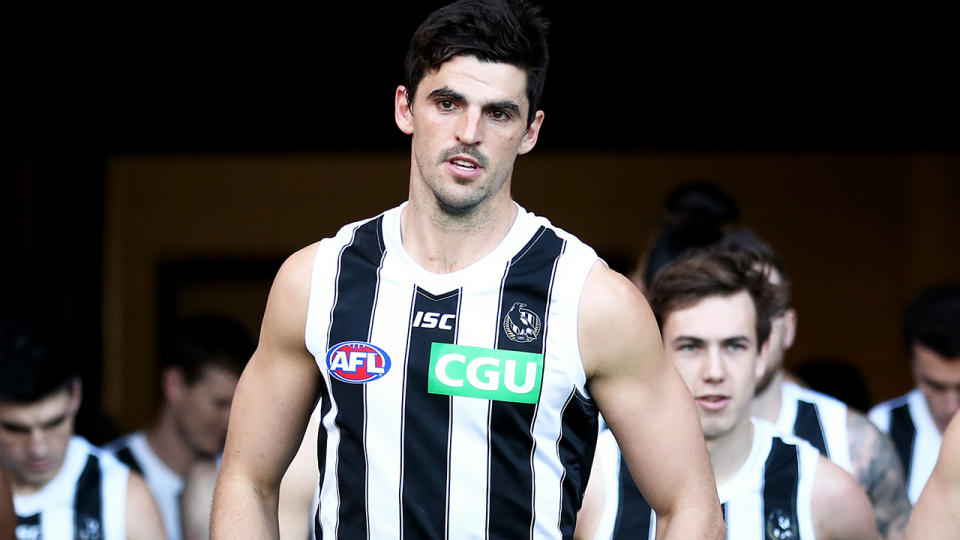
Chris Judd gets the nod in the middle, thanks to his combination of inside nous, toughness, and especially his skills by foot. The West Coast Eagles and Carlton star was part of the memorable 2001 ‘super-draft’, and during his peak from 2004 to 2011, was arguably the competition’s premier player. Judd’s ability to burst free from packs and deliver the ball with lightning accuracy was second to none - culminating in him captaining the Eagles to their sensational 2006 premiership.
There’s an argument to that Adam Goodes could well be the most useful player on this team. Need someone to start on the wing? Check. Need someone to pinch-hit in the ruck? Check. Need a key position player on short notice? Check. Need a dual-Brownlow Medal, dual premiership winning, inspirational captain? Check. Few can claimed to have served the game better than Goodes, on and off the field. The Sydney Swans champion deserved to retire from the game in a blaze of glory, not booed out of his profession as he was. Despite this, his impeccable record stands unmoved.
Honourable mentions: Lenny Hayes (St Kilda), Ben Cousins (West Coast), Jimmy Bartel (Geelong)
Half-forwards: Nick Riewoldt, Jonathan Brown, Lance Franklin
Nick Riewoldt has taken more marks inside 50 and more contested marks, period, than any other player since the year 2000. The St Kilda champion hauled in more than 100 more contested marks than the next best player (Collingwood’s Travis Cloke) and was a central figure in a period of dominance from 2008 to 2012 that the Saints ultimately were unable to convert into a premiership. Riewoldt took after the last great Saint to come before him, dual Brownlow winner Robert Harvey, using his unparalleled endurance to run defenders into the ground. His motor allowed him to move onto a wing later in his career - hence his selection on the flank.
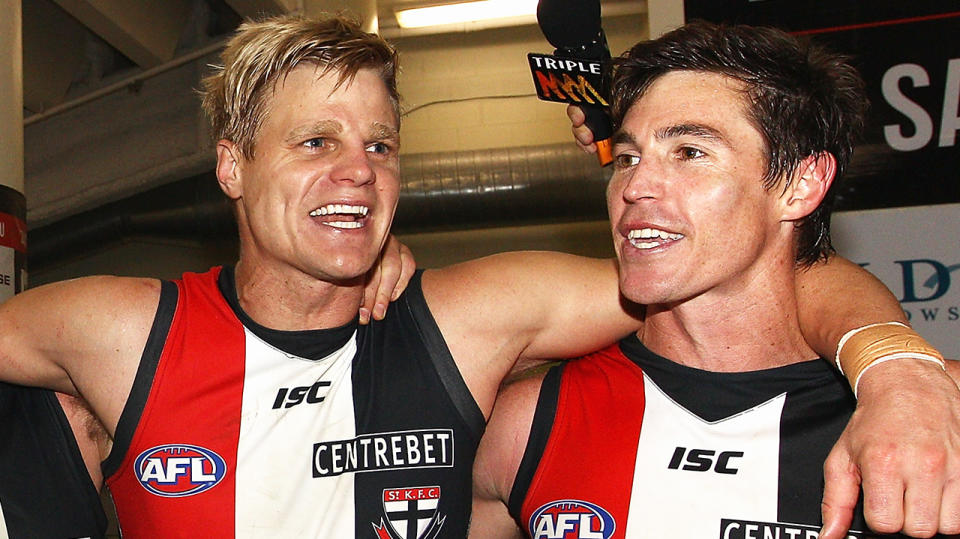
Jonathon Brown’s career was ultimately ruined by a series of concussions, but in full flight the Brisbane Lions superstar was a 21st century throwback to the forward line supremos of old. Tough, uncompromising and, under the tutelage of Leigh Matthews, was one of, if not the dominant forwards of the 2000s. Bonus points for that unforgettable slo-mo clip of him scowling at the Channel 10 cameras in the rain, as well as his classic ‘I don’t run on me face’ line when asked after surgery for a nightmarish facial fracture in 2011.
As for Lance Franklin, his selection should be automatically justified by the fact he’s the only player on this list to even sniff the dual milestones of 350 games and 1000 goals. Injuries and an unforeseen global pandemic might have put those milestones in jeopardy, but Buddy at full flight will always be a sight to behold. Like Riewoldt, Franklin’s motor opened up so much of his game, combined with an almost perfect forward line teammate at Hawthorn in Jarryd Roughhead. Two premierships, eight All-Australian nods, 300 games and 944 goals and counting, Franklin’s legacy is assured.
Honourable mentions: Matthew Pavlich (Fremantle), Matthew Richardson (Richmond), Jarryd Roughead (Hawthorn)
Forwards: Cyril Rioli, Josh Kennedy, Jason Akermanis
Hawthorn’s Cyril Rioli really re-defined the goal-sneak archetype during his 10-year career with the Hawks, which culminated in a Norm Smith Medal in 2015. Rioli nearly single-handedly demolished the West Coast Eagles that year in one of the most dominant grand final performances in recent history. Rioli booted 275 goals in 189 games - fewer than many of the pre-eminent small forwards of his generation, but the Hawthorn champion boasted a versatility that set him apart from his contemporaries. True to the Rioli name, his electrifying style of play made him a must watch week in, week out.
While the traditional full-forward fell out of favour after the turn of the century, West Coast’s Josh Kennedy has stamped himself as one of the game’s great goalkickers after being part of the package West Coast received in exchange for Chris Judd in 2007. His signature stutter-step run up might be the bane of every junior coach’s existence, but you can’t argue with the results - 611 goals in 243 games is about as effective as you can get. Kennedy’s two Coleman Medals and three All-Australian selections assure him of a place on this squad.
Perhaps controversially, Brisbane’s Jason Akermanis gets the nod in the other pocket. While his divisive personality made more headlines throughout his career than his play, Akermanis honed his reputation as a goalsneak with the Lions before Leigh Matthews threw him into the midfield - culminating in a Brownlow Medal in the first of three consecutive premiership years for the Lions in 2001. His late renaissance returning to the forward line for the Western Bulldogs culminated in a heartbreaking 2009 preliminary final loss to St Kilda, with Akermanis hanging up the boots a year later.
Honourable mentions: Eddie Betts (Carlton), Paul Chapman (Geelong), Stephen Milne (St Kilda)
Followers: Dean Cox, Gary Ablett Jr, Nat Fyfe
Few ruckman could claim to be as consistently influential and impactful for their clubs as West Coast legend Dean Cox. In 290 games for the Eagles, Cox claimed a flag in 2006, as well as earning All-Australian honours in six seasons. The 204-centimetre giant was one of the most mobile ruckmen throughout the 2000s and 2010s, taking advantage of his impressive fitness to run opposing big men off their feet. Cox was arguable the Eagles’ most reliable contributor after the departures of club greats Chris Judd and Ben Cousins, regularly racking up 20+ disposals each match.
There was no way Gary Ablett Jr was not going to make it onto this list - no midfielder had as big an impact on the game as the Geelong champion. With 346 games under his belt between Geelong and the Gold Coast Suns, two Brownlow Medals, five Leigh Matthews trophies for the AFLPA Most Valuable Player and two premierships, Ablett’s run of dominance from 2007 to 2013 has yet to be topped. A ball winning machine, no player has had more inside-50s than Ablett since 2000 and it wasn’t even close. Ablett wasn’t just adept at extracting the ball from congested areas of the ground, he was also lethal when given space - especially as a forward. Ablett led Geelong’s goalkicking in 2006, as well as the Suns’ in 2012 and 2013.
Dual Brownlow Medal winner Nat Fyfe takes the final on-ball spot, with ability when the ball is contested nigh unparalleled among modern stars. Fyfe’s laid back demeanour belies a fierce competitive streak, which culminated in him willing a determined Fremantle side to their first AFL grand final in 2013. While not the most polished kick, Fyfe’s ability to win contested footy sets him apart.
Honourable mentions: Dane Swan (Collingwood), Sam Mitchell (Hawthorn), Trent Cotchin (Richmond), Patrick Dangerfield (Geelong)
Interchange: Simon Black, Steven Johnson, Dustin Martin, Joel Selwood
You’d be pretty thrilled to start a game with these four on the pine. Simon Black didn’t receive the attention more high profile teammates like Michael Voss, Jonathan Brown and Jason Akermanis got, but among those in the know he was critically acclaimed. The engine powering the Lions’ ferocious midfield in the early 2000s and a Brownlow Medal winner, Black remains one of the most consistently underrated players of his time.
Geelong’s Steven Johnson gets a nod on the bench, as one of the AFL’s most versatile forwards. Johnson was a key player in the Cats’ 2007 breakthrough, winning the Norm Smith medal after nearly finding himself out of a job the summer before after a pre-season drinking scandal. While he was never far from controversy throughout his career, Johnson’s 516 goals in 293 games for Geelong and Greater Western Sydney, as well as his three premierships, more than qualify him among the game’s best.
Dustin Martin is hard done by not to start on the ground, but will almost certainly make us look silly when we revisit this side in years to come. His arrival as a truly elite AFL midfielder was a key factor in Richmond’s long-awaited return to premiership glory in 2017 and then again in 2019. His signature ‘don’t argue’, brute strength and thumping kick make him a force to be reckoned with.
Finally, Geelong’s Joel Selwood can’t be ignored. Another key part of the Cats’ All-Star midfield alongside the likes of Ablett, Josh Kelly and Jimmy Bartel, Selwood has been roundly acknowledged as one of the AFL’s greatest captains.
Honourable mentions: Brendan Fevola (Carlton/Brisbane), Nick Dal Santo (St Kilda/North Melbourne), Jobe Watson (Essendon), Josh Kelly (Geelong/Essendon)
